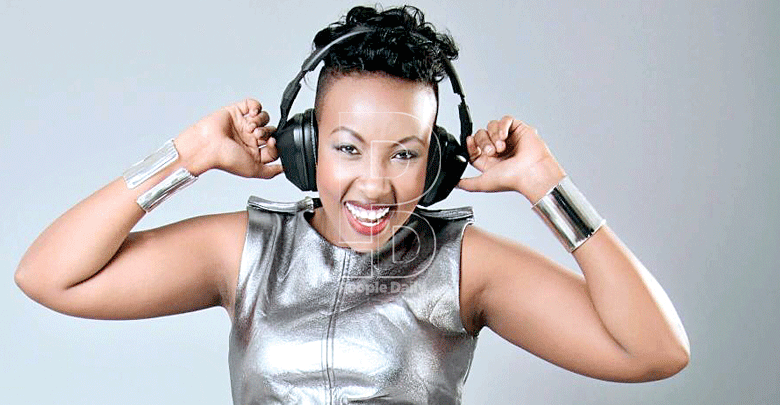Kenyan media and entertainment industry are replete with talent
By Alfayo Onyango, August 30, 2019Not so long ago, a dark-skinned socialite-cum-video vixen, Vera Sidika existed. Some time in 2012, the endowed lass caused a stir when she hired herself out to appear in a music video You Guy by music group P-Unit featuring Collo. The group has since become extinct — albeit unofficially — and Collo (formerly of rap group Kleptomaniax) saw the light and now peddles gospel through music. Vera’s appearance in the video, with her melanin popping, propelled her to a household name.
Two years later, however, Vera chose to invest millions to lighten her skin, through bleaching. In different interviews later, the socialite has ever remained cagey she bleached her skin for the money, maintaining that she did it to ‘just a have a light skin’. But why? Every action must have a reason to it.
“Society has always stereotyped that ‘yellow yellow’ people are prettier, hotter or more attractive than their dark-skinned counterparts. But the reality is, everyone is beautiful in their complexions,” former Miss Kenya Cecilia Mwangi tells Spice.
She says although discrimination based on skin colour has been practiced in the modelling, acting, beauty pageantry and TV industries, things are slowly changing and dark-skinned people are now taking center stage.
“You can even see it on billboards; dark-skinned people (especially women) are getting the recognition. In beauty pageantry, more and more dark-skinned beauty queens are on the scene.
The same is happening in the cosmetics industry; more products for the dark skin are now available, and this is a clear indication that the future of dark-skinned people is indeed bright.

In 10 years, even though it will not be 100 per cent, people with dark skins will boss all these industries. The bottom line is, there are opportunities for all of us, our skin colour not withstanding,” she says.
The media
With a vast selection of TV channels and radio stations to air drama shows, music and news broadcasts, something looms behind the smoke mirrors that many people do not realise. Does your channel of choice do you justice when it comes to representation of skin colour, or is it just an issue of instigating silent wars?
The issue on inclusivity is something that has existed for eons in media not only locally, but even in countries such as Brazil, where black population are segregated despite being the prominent race. The sour taste of racism is one they can’t escape.
Kenyan entertainer host Shaquille Oduk aka ShaqTheYungin is a 23-year-old YouTuber-turned radio presenter. He sparked a wild backlash among netizens when one of his series shows titled Light Skin vs Dark Skin Women premiered on YouTube last year.
Alongside sassy TV and radio presenter Tracy Wanjiru they had a steamy conversation on preferences, taboos, and definitions on the same. Due to the sensitivity of the topic, comments were disabled when views hit 35,000, as the public’s views on shades attracted divided opinion.
Hard to run away from were allegations of Shaq attempting to shame one shade at the expense of another, when evidently the young man was only interested in creating content most people are, somewhat, afraid of confronting in public. And the ruthless ‘keyboard warriors’ turned on him with all manners of name-calling.
“Colourism in media is the reason many dark skin women prefer changing their skin colour to ‘fit’ in the social context of the Kenyan media. People of colour gain more attention for viewership. TV is visual and attracts, it’s as simple and as sad as it is,” says K24 news presenter Karen Karimi Knaust.
Music scenes
It’s a burning issue that could have been the reason ‘shade’ with some hints of hatred was thrown at rapper Khaligraph Jones in 2017, when he once appeared for a TV show looking like he had bleached. With her polarising skin bleaching ventures, Vera Sidika has always triggered split opinion both in the media and public. But who are we to judge?
“I don’t know anyone specifically who got turned down from a job or experienced the bias first hand because of their skin colour, but I’m sure such disparities exist. It’s been normalised that it no longer alarms people including the victims,” says music promoter Bilha Wanjiku.
She adds: “The underlying problem is majorly consumer behaviour, where people genuinely gravitate towards the light-skinned. It’s something we have to learn, because in quarters such as Hollywood, it is a tactic that has been used for years to run their agenda and we are just realising melanin is beautiful. However, we might have a long way to go before someone can tell our dark-skinned young ones they are pretty and make them believe it.”
“A while back, the issue of skin colour was glaring. However, the narrative started to change and now there’s a lot more investment in merit than the skin tone of a presenter. However, it certainly still exists visibly in music videos. The narrative that’s pushed is to the advantage of light-skinned women.
“The reason this is wrong is obvious, but mostly because at a time when women are being celebrated because of our achievements, colourism is condescending to those achievements,” says TV host and Lifebuoy brand ambassador Janet Mbugua.
The colourism conversation is wide, but it is people such as the youth aspiring to be presenters or with hopes of ending up on TV screens and magazines that should be informed about the depths of waters they are trying to swim in.
“The process of selecting a presenter, many a times, is in regards to the type of show that dictates the kind of person who will be shortlisted for auditions, or screen test,” says Justus Tharao, head of programming at a local TV station.
On whether the colourism aroma gets to enter the kitchen of the selection process of presenter selection, Tharao says: “Once upon a time, media was caught in that, but a lot has changed where we see melanin, or black beauty, as a beauty statement — a way of celebrating our culture and heritage as black people.”
The established superiority complex is a falsehood and the social conditioning — especially through both the mainstream media and social media — has been so drastic that melanin is now being looked at as a niche and a commercial product more than a sense of beauty and pride.
“Colourism is an outdated mindset that’s born out of colonisation. The lighter you were the more acceptable or better you were. No need to name drop. It’s a mindset that has to shift, although it’s happening slowly. More needs to be done,” says Janet.
Future of the youth
Radio presenter Mwalimu Rachel says: “Light skins are preferred more to dark skins; more light skinned ladies and guys are video vixens, some people justify it in terms of lighting and claim light skins ‘pop’ more or look better on screens or stage. I am ‘lucky’ enough to be a light skin girl, so I have not faced deep discrimination over my skin tone, however, if a lighter skinned girl walks into an audition room, she will make heads turn in her direction suddenly a I start feeling uneasy.”
She adds that media will always be about numbers and as a business, she understands why some media houses would play the light skin game to get viewership and interaction.
“They will justify and say, it’s what society seems to like and we are just giving them what they like. However, the conversation needs to start in our homes. What are we telling our kids and younger siblings about skin tone and loving yourself for how you look like?
We need to build confidence in whichever skin we are in. Dark, light, indigo, doesn’t matter! It’s about confidence and getting the job done at the end of the day.
As media and entertainment industry, we need to look past the tone and focus on delivery and confidence. That’s how we’ll change the narrative,” says Rachel, the lead presenter at NRG Radio.
